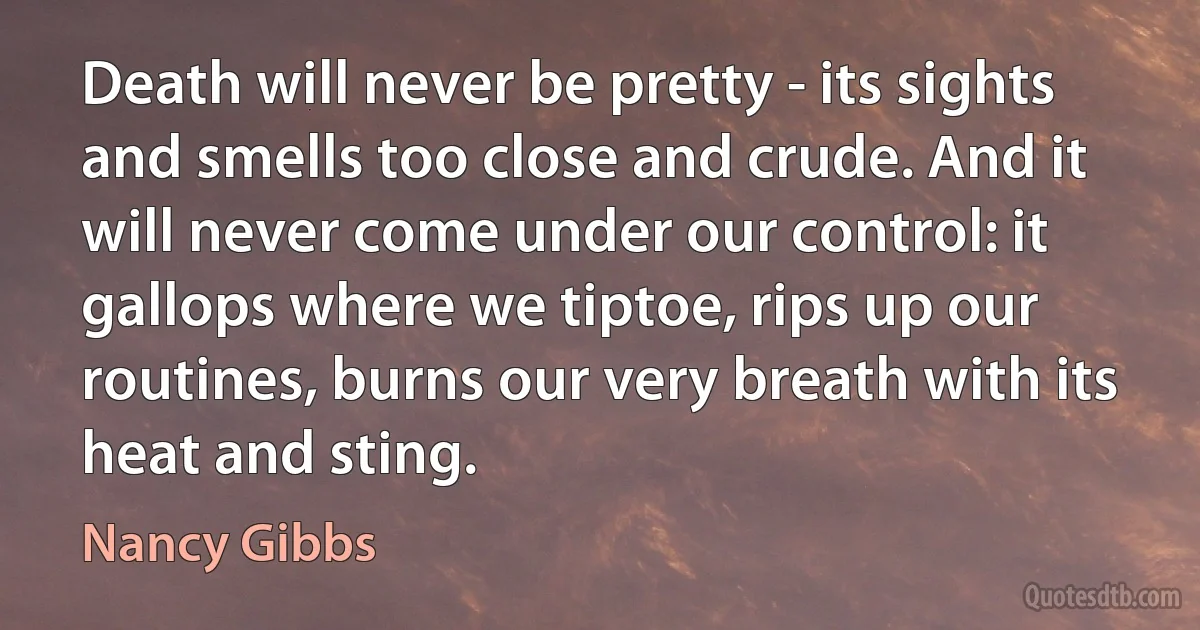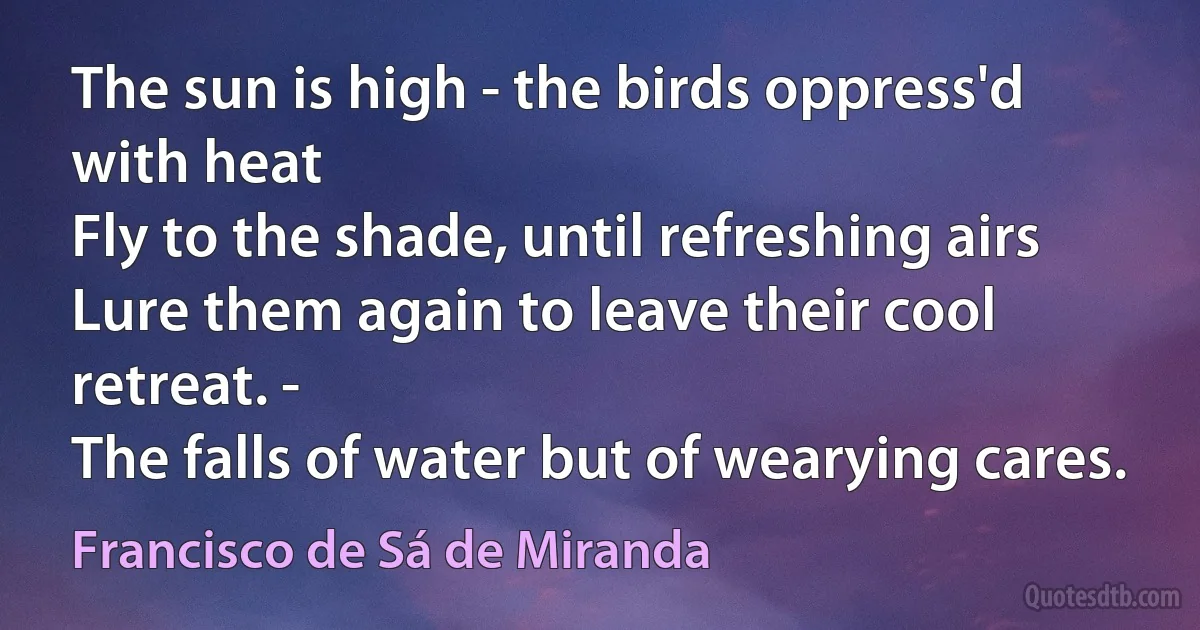Heat Quotes - page 15
The bulls snorted and spurted from their mouths devouring flames, like a perforated crucible when the leather bellows of the smith, sometimes ceasing, sometimes blowing hard, have made a blaze and the fire leaps up from below with a terrific roar. The deadly heat assailed [Jason] on all sides with the force of lightning. But he was protected by Medea's magic.

Apollonius of Rhodes
I should wish, however, to know what this reason is, through which we are more excellent than all the tribes of animals. Is it because we have made for ourselves houses, by which we can avoid the cold of winter and heat of summer? What! do not the other animals show forethought in this respect? ... But if nature, which gave them life, had chosen to give to them also hands to help them, they too would, without doubt, raise lofty buildings and strike out new works of art. Yet, even in those things which they make with beaks and claws, we see that there are many appearances of reason and wisdom which we men are unable to copy, however much we ponder them, although we have hands to serve us dexterously in every kind of work.

Arnobius
That the stars are celestial bodies with no mind or soul. They neither know the future nor affect people. Their effect on people however can be through their physical characteristics, such as the effect of the sun's heat and rays on the planets and the effect of the moon on the tides of seas.

Ibn Hazm
If it were not for the depressing heat and the urgency of the work, one could sit down and laugh to tears at the absurdity of the thing, and under the circumstances it is a little wearing. But our motto is the old west coast proverb,; in other words, don't flurry; patience gains the day.

Robert Baden-Powell
Higher, directed forms of energy (e. g., mechanical, electric, chemical) are dissipated, that is, progressively converted into the lowest form of energy, i. e., undirected heat movement of molecules; chemical systems tend toward equilibria with maximum entropy; machines wear out owing to friction; in communication channels, information can only be lost by conversion of messages into noise but not vice versa, and so forth.

Ludwig von Bertalanffy
Gravitation is entirely independent of everything that influences other natural phenomena. It is not subject to absorption or refraction, no velocity of propagation has been observed. You can do whatever you please with a body, you can electrify or magnetise it, you can heat it, melt or evaporate it, decompose it chemically, its behaviour with respect to gravitation is not affected. Gravitation acts on all bodies in the same way, everywhere and always we find it in the same rigorous and simple form, which frustrates all our attempts to penetrate into its internal mechanism.

Willem de Sitter
I dream of a sculpture in which landscape, architecture and city are one. It might be a city like Marseille, a city steaming with heat which suddenly transmogrifies. I becomes an immense piece of sculpture, a gigantic figure, made up of white blocks and segmented by flat, horizontal terraces, arranged in a bare and motionless landscape.

Fritz Wotruba
By another way, therefore, I endeavoured to attain the same end; and since it is a property of water that a small quantity of it, converted into steam by the force of heat, has an elastic force like that of the air, but, when cold supervenes, is again resolved into water, so that no trace of the said elastic force remains; I felt confident that machines might be constructed wherein water, by means of no very intense heat, and at small cost, might produce that perfect vacuum which had failed to be obtained by aid of gunpowder. But of the various constructions which can be contrived for this purpose, the following seemed to me to be the most suitable.

Denis Papin
I have endeavoured to attain this end (viz. the production of a vacuum in the cylinder) in another way. As water has the property of elasticity, when converted into steam by heat, and afterwards of being so completely recondensed by cold, that there does not remain the least appearance of this elasticity, I have thought that it would not be difficult to work machines in which, by means of a moderate heat and at a small cost, water might produce that perfect vacuum which has vainly been sought by means of gunpowder.

Denis Papin
The phenomenon of the production of motion by heat has not been considered from a sufficiently general point of view. We have considered it only in machines... [for which] the phenomenon is... incomplete. It becomes difficult to recognize its principles and study its laws. ...[T]he principle of the production of motion by heat... must be considered independently of any mechanism or... particular agent. It is necessary to establish principles applicable not only to steam-engines but to all imaginable heat-engines, whatever the working substance and whatever the method by which it is operated.

Nicolas Léonard Sadi Carnot
The careful experiments of Joule, who developed heat in various ways by the application of mechanical force, establish almost to a certainty, not only the possibility of increasing the quantity of heat, but also the fact that the newly-produced heat is proportional to the work expended in its production.

Rudolf Clausius
Wherever there exists a difference of temperature... it is possible to have also the production of impelling power. ...All substances in nature can be employed for this purpose, all are susceptible of changes of volume, of successive contractions and dilatations, through the alternation of heat and cold. All are capable of overcoming in their changes of volume certain resistances... A solid... A liquid... An aeriform fluid... If it is enclosed in an expansible space, such as a cylinder provided with a piston, it will produce movements of great extent. Vapors of all substances capable of passing into a gaseous condition, as of alcohol, of mercury, of sulphur, etc., may fulfil the same office as vapor of water. ...Most of these... have been proposed, many even have been tried, although... without remarkable success.

Nicolas Léonard Sadi Carnot
The steam-engine having furnished us with a means of converting heat into a motive power, and our thoughts being thereby led to regard a certain quantity of work as an equivalent for the amount of heat expended in its production, the idea of establishing theoretically some fixed relation between a quantity of heat and the quantity of work which it can possibly produce, from which relation conclusions regarding the nature of heat itself might be deduced, naturally presents itself. Already, indeed, have many successful efforts been made with this view; I believe, however, that they have not exhausted the subject, but that, on the contrary, it merits the continued attention of physicists... The most important investigation in connexion with this subject is that of S. Carnot.

Rudolf Clausius
My memoirs "On the Mechanical Theory of Heat" are of different kinds. Some are devoted to the development of the general theory and to the application thereof to those properties of bodies which are usually treated of in the doctrine of heat. Others have reference to the application of the mechanical theory of heat to electricity. ...Other memoirs... have reference to the conceptions I have formed of the molecular motions which we call heat. These conceptions, however, have no necessary connexion with the general theory, the latter being based solely on certain principles which may be accepted without adopting any particular view as to the nature of molecular motions. I have therefore kept the consideration of molecular motions quite distinct from the exposition of the general theory.

Rudolf Clausius
If for the entire universe we conceive the same magnitude to be determined, consistently and with due regard to all circumstances, which for a single body I have called entropy, and if at the same time we introduce the other and simpler conception of energy, we may express in the following manner the fundamental laws of the universe which correspond to the two fundamental theorems of the mechanical theory of heat.
1. The energy of the universe is constant.
2. The entropy of the universe tends to a maximum.

Rudolf Clausius


![[W]hen a body has experienced any changes, and when after a certain number of transformations it returns to precisely its original state, that is, to that state considered in respect to density, to temperature, to mode of aggregation-let us suppose, I say, that this body is found to contain the same quantity of heat that it contained at first, or else that the quantities of heat absorbed or set free in these different transformations are exactly compensated. This fact has never been called in question. It was first admitted without reflection, and verified afterwards in many cases by experiments with the calorimeter. To deny it would be to overthrow the whole theory of heat to which it serves as a basis. For the rest, we may say in passing, the main principles on which the theory of heat rests require the most careful examination. Many experimental facts appear almost inexplicable in the present state of this theory. (Nicolas Léonard Sadi Carnot)](https://cdn.quotesdtb.com/img/quotes_images_webp/70/nicolas-l-onard-sadi-carnot-946670.webp)
